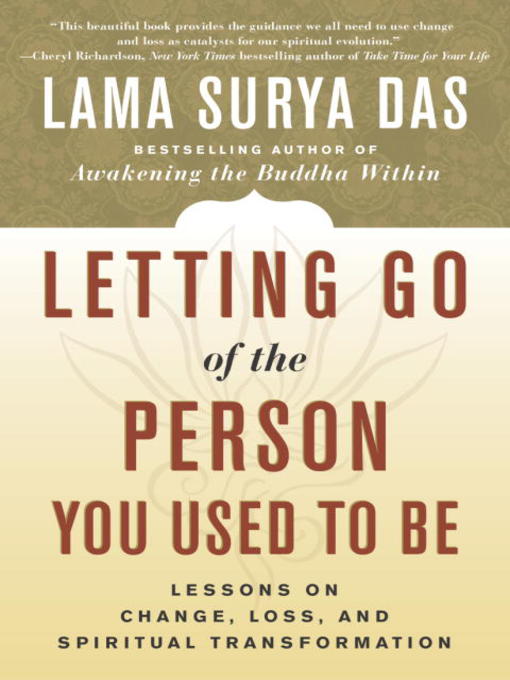Letting Go of the Person You Used to Be
Lessons on Change, Loss, and Spiritual Transformation
lively universal teaching style has awakened the spirituality of thousands, now shares an enlightened approach to change and loss, dealing with difficult emotions such as fear, grief, and anger, and the role of crisis in uncovering our authentic selves.
For many people, recent years have been characterized by profound change, whether it relates to financial upheaval, political shifts, or even massive losses of life to disease and violence. Even on the personal level each person must confront the curves life throws his or her way. Buddhism has a great deal to say about change and impermanence and how to meaningfully deal with it. Change—whether on a large or small scale—provides our most important opportunity for learning about ourselves and the nature of reality. From this essential insight Lama Surya Das has crafted a fulfilling and important path to understanding and healing ourselves and finding peace.
Full of personal stories, anecdotes, practical exercises, guided meditations and reflections, and pithy original aphorisms, Letting Go of the Person You Used to Be addresses life's most universal difficulties in a way that is accessible to all. By using memorable concepts such as The Virtues of Adversity, The Pearl Principle ("No inner irritation, no pearl"), and Gaining through Loss, Surya reminds readers that hiding from change and loss is futile. Learning to consciously accept and embrace change leads to a better understanding of ourselves and our own innate divine light.
-
Creators
-
Publisher
-
Release date
August 24, 2004 -
Formats
-
Kindle Book
-
OverDrive Read
- ISBN: 9780767919623
-
EPUB ebook
- ISBN: 9780767919623
- File size: 397 KB
-
-
Languages
- English
-
Reviews
-
Publisher's Weekly
June 30, 2003
Das, an American-born lama in the Dzogchen lineage of Tibet and author of the bestseller Awakening the Buddha Within, here explores the losses and changes that inevitably mark our lives. He argues that what is important is not that difficult things happen (Buddhism's first truth, after all, is that life is suffering), but how we deal with them. Pure detachment from loss and sorrow is not sufficient, he says; the goal is non-attachment to circumstances that are by nature impermanent. Despite losses and pain, we still need to be fully engaged with the world: "Spiritual detachment or equanimity should never be equated with indifference or complacent resignation." One of the strongest sections of the book is Das's simple chronicle of various losses he has suffered, both enormous (the death of his father) and mundane (a stolen bike). Thus acknowledged, his echoing pain prevents the book from being self-help pabulum about how bad things make good people stronger. The writing style, composed mostly of short, choppy sentences, seems well suited for effective public speaking, but unpolished for a book. Many of Das's recommendations—meditating, journal writing, "naming" your feelings, visualizing attachments, chanting a healing mantra—are fairly standard self-help ideas, as are the classic and familiar Buddhist anecdotes sprinkled throughout the book. But there are also great and original nuggets of wisdom here, as when Das advocates the ancient Tibetan practice of chod, a hero's quest-like ritual to confront personal fears.
-
Formats
- Kindle Book
- OverDrive Read
- EPUB ebook
subjects
Languages
- English
Loading
Why is availability limited?
×Availability can change throughout the month based on the library's budget. You can still place a hold on the title, and your hold will be automatically filled as soon as the title is available again.
The Kindle Book format for this title is not supported on:
×Read-along ebook
×The OverDrive Read format of this ebook has professional narration that plays while you read in your browser. Learn more here.

